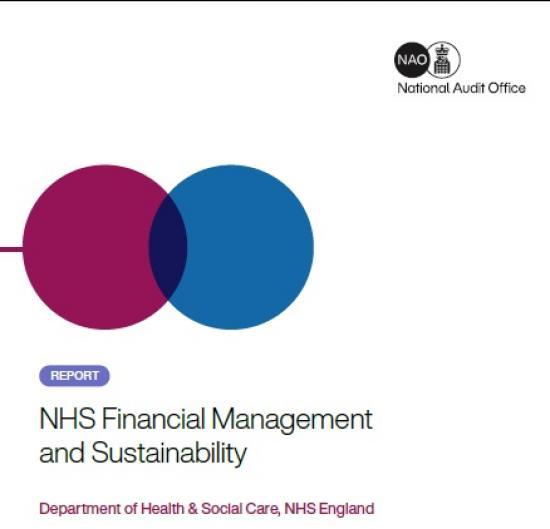NHS Financial Management And Sustainability 2024 - England
24th July 2024

The report from The National Audit Office on the NHS in England mirrors similar positions for the NHS in Scotland - they are all in financial trouble.
This is our ninth report on the financial management of the NHS in England. We published our last report in February 2020, finding that, to bring about lasting stability, NHS England (NHSE) needed to engage in financial restructuring. We stated that the delivery of long-term financial sustainability would remain at risk unless all NHS bodies were on a realistic path to breaking even.
Since we last reported, the Health and Care Act 2022 has introduced Integrated Care Systems (ICSs) on a statutory footing, which brings together NHS bodies, local government, and other organisations.
There are 42 ICSs covering England, each with an Integrated Care Board (ICB) - an NHS body with members nominated by NHS trusts, providers of primary medical services, and local authorities. ICBs receive funding from NHSE, and commission and pay for NHS services in their area.
Scope of the report
The scope of this report is NHS England's (NHSE) and Department of Health & Social Care's (DHSC) financial management of the NHS in England. Specifically, it looks at how much the NHS can manage its current operations within the financial resources it has available while making progress towards its long-term goals.
The report sets out:
the NHS's current financial position and operating context
whether NHSE's financial management processes allow accurate and timely decision-making and support for NHS bodies that are struggling
the relationship between financial management and NHS performance, productivity, and efficiency
the challenges to the NHS's financial sustainability in the longer term
Conclusions
The scale of challenge facing the NHS today and foreseeable in the years ahead is unprecedented.
Following the statutory introduction of Integrated Care Systems (ICSs) in 2022, we concluded that they needed time and capacity to build relationships and design services that could better meet local needs. While some transformation is occurring, the pace of change has been slow as ICSs struggle to manage the day-to-day pressures of elective recovery following the pandemic, continual rising demand for NHS services, and significant workforce and productivity issues.
As they are statutorily required to do, NHS England and NHS systems have prioritised trying to live within their allocated funding. But, despite great in-year efforts to do so - some of which privilege the short term at the expense of the long term - an increasing number of NHS bodies have been unable to break even.
When we consider how the health needs of the population look set to increase, we are concerned that the NHS may be working at the limits of a system which might break before it is again able to provide patients with care that meets standards for timeliness and accessibility.
Our report identifies operational improvements which can help the NHS to do more with the resources it has. However, there is a wider question for policymakers to answer about the potential growing mismatch between demand for NHS services and the funding the NHS will receive. Either much future demand for healthcare must be avoided, or the NHS will need a great deal more funding, or service levels will continue to be unacceptable and may even deteriorate further.
Read the full NAO report HERE
Pdf 59 Pages
Summary
Pdf 13 Pages
Report Main Page
